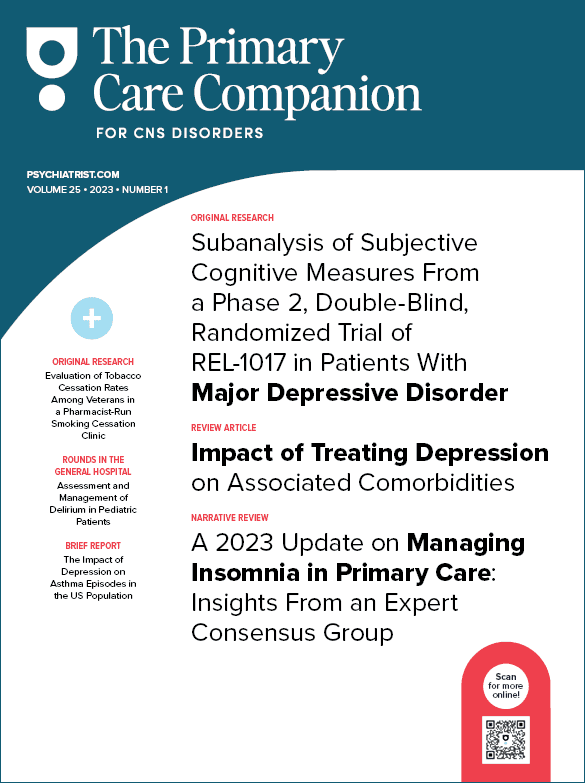Because this piece does not have an abstract, we have provided for your benefit the first 3 sentences of the full text.
After the presidential election in the United States, many of us working at the interface of primary care and psychiatry are unsure about what 2017 will bring. There are likely to be significant departures from the financing strategies many expected to drive the evolution of medical care. In many communities, access to care, particularly for those most in need, may decrease.

After the presidential election in the United States, many of us working at the interface of primary care and psychiatry are unsure about what 2017 will bring. There are likely to be significant departures from the financing strategies many expected to drive the evolution of medical care. In many communities, access to care, particularly for those most in need, may decrease. Direct support for the integration of medical and behavioral care, such as through funding for patient-centered medical homes and their multidisciplinary teams, may diminish. But, some things will not change:
- Psychiatric disorders and chronic medical illness will continue to be cotravelers—both promoting the other’s development and progression.
- This disease combination will continue to be frequent and, if not effectively managed, expensive—for the patient, the family, the health care system, the employer, and society.
- Many societal responses, especially for those most in need, will continue to fail:
- Prison does not work.
- Medical care divorced from psychiatric care does not work.
- Psychiatric institutionalization does not work.
- Not dealing with these patients—leaving them on the streets and ignoring them—does not work.
- Low-cost telephonic care-management strategies do not work.
But, integrated management of psychiatric and medical conditions can work. Adequate engagement (case-finding and registry surveillance), frequent contact and timely measurement-based treatment adjustment, caring staff skilled in motivating and supporting patients, and attention to the person all are required. Access to medical and psychiatric expertise is invaluable. The marriage of primary care and psychiatry is required to adequately support patients over the long-term in their homes, families, and communities.
Over the last 2 decades, we have learned a lot. In the late 90s and early 2000s, we learned that identifying and managing depression and other psychiatric conditions could improve the lives of affected patients. We defined the essential ingredients of strategies that work. We learned how to integrate these systems into our health care systems. We learned that it takes hard work and resources to change exceptional care into expected and usual care.
We also have come to understand the biological underpinnings of the interrelationships between the brain, its disorders, and other medical conditions. Early on, we recognized the influence of psychiatric conditions on the hypothalamic-pituitary-adrenal axis and on the sympathetic nervous system. And, we mapped the resultant interactions between these mechanisms and cardiovascular and endocrine heath and disease. More recently, we are learning about additional mechanisms, for example, the engagement of immune and inflammatory pathways, angiogenesis and neurogenesis, and alterations in energy metabolism and diet. We also have insight into brain mechanisms that lead to altered cognition and behaviors. These mechanisms include the weakening or reshaping of connections of critical brain centers and networks, for example, inefficient coordination between the sentinel network responsible for monitoring and alerting, the default mode network and its function in rumination and introspection, and the network that engages in prioritizing and managing goal-directed executive function. We have greater understanding of the brain alterations that lead to altered perception and interpretation of our environment, to apathy and indecision, and then to repeated substance use and poor adherence even with care plans with goals the patient cares about. These biological insights are now informing refinement of care provision such as frequent patient engagement including monitoring of their conditions, clarity of goal setting, active frequent contact and use of evidence-based motivation techniques, concurrent rather than sequential care of medical and psychiatric problems, and active patient-centered support that helps patients cope with their lives, not just with their disorders.
Thus, we now better understand the prevalence of medical-psychiatric comorbidity and its impact. We have recognized strategies that are inadequate and are taking into consideration the biological fundamentals that lead to the occurrence of comorbidity and resultant patient behaviors to inform intervention.
The human condition and the progress described here are not subject to an election. Advancements arise from the global effort of investigators and clinicians and from those skilled at sculpting care delivery systems. In the United States, a remaining challenge is to organize a financing framework that couples the benefit from effectively managing comorbid patients with the direct and indirect costs of the required care. Other countries are engaged in the same challenge. In the United States, the focus of innovation supportive of the evolution and spread of effective systems of care may shift from the federal (national) level to states and localities.
But for the clinician, patients and their needs will not change. High skill at the interface of primary care and psychiatry will continue to be a prerequisite to helping patients. The Primary Care Companion for CNS Disorders and its associated web-based educational resources will continue to be a source for learning and the ongoing conversation among investigators—between the laboratory and practice and between those whose disciplinary origins were medical and behavioral.
The accomplishment by our publisher and the Physicians Postgraduate Press, Inc., staff in attaining inclusion of the PCC by the National Library of Medicine is major. This achievement requires that the PCC be fully indexed and abstracted and available through a repository structured to endure into the far distant future. Thus, 100 years from now the PCC will continue to be a permanent, accessible chronicle of insights into the human condition and into the development of strategies by which those of us in health care can effectively engage with our patients with psychiatric and neurologic conditions. Within this context, I want to thank our or editorial board and our reviewers, whose input often leads to substantial refinement of final published work, and to the authors whose work benefits us all.
Prim Care Companion CNS Disord 2017;19(1):17ed02100
https://doi.org/10.4088/PCC.17ed02100
© Copyright 2017 Physicians Postgraduate Press, Inc.
Reviewers for The Primary Care Companion
for CNS Disorders
January 1, 2016-December 31, 2016
Lawrence W. Adler
Gulrayz Ahmed
Donna Ames
Melissa Arbuckle
Jean-Michel Aubry
Jonathan D. Avery
Gabriela Balf
James G. Barbee
Manish Bathla
Ruth M. Benca
Jyotik Bhachech
Manjeet S. Bhatia
Erla Bjornsdottir
Douglas L. Boggs
James Bourgeois
Diana Brixner
E. Sherwood Brown
Sarah Buckley
Melissa M. Butler
Lionel Cailhol
Harold Carlson
Peter Chan
Chih-Chiang Chiu
Ka Fai Chung
Les Citrome
Paul Croarkin
Lucette Cysique
Geetha Desai
Kyle de Young
William Dubin
Norma Dunn
Simou Effie
Anna G. Engel
Lawrence R. Faziola
Praveen Fernandes
Alexandra Flynn
Katlein Franca
Dalmacio H. Francisco
Jane Gagliardi
Prashant Gajwani
Erica Garcia-Pittman
Sachin R. Gedam
David S. Geldmacher
Vinu George
Celio Gonçalves
Miguel Angel Gonzalez-Torres
David W. Goodman
Christopher D. Gordon
Daniel F. Gros
Zeba Hasan Hafeez
Ahmad Hameed
Emily R. Hawken
James I. Hudson
Joshua A. Israel
Mohammad Jafferany
Tushar Jagawat
Fred Jarskog
Priyanga Jayakumar
Bhattacharya Kaberi
Feroze Kailyadan
Argyro Kalaitzaki
Arun Kandasamy
Rakesh Karmacharya
Amy M. Kilbourne
Brent M. Kious
Erin Koffel
Maju M. Koola
Lorrin M. Koran
Michael J. Lambert
Raphael J. Leo
Barry I. Liskow
Matthew Macaluso
Ahsan Mahmood
J. Sloan Manning
Alina Marin
Prakash S. Masand
Joseph McEvoy
Shane J. McInerney
Rebecca McKetin
Yoram Mouchenik
Bianca L. Negrao
Bhusan Neupane
Jude U. Ohaeri
Mark A. Oldham
Albino J. Oliveira-Maia
Philip J. Osteen
Ferdnand C. Osuagwu
Prasad Padala’ ©
Eduard Parellada
Christine M. Peat
Ronald W. Pies
Murray A. Raskind
Kathlyn J. Ronaldson
Stephen Saklad
Lampros Samartzis
Mamta Sapra
Andrea Schmitt
Asim A. Shah
Ashish Sharma
Brian B. Sheitman
Gregory E. Simon
Yvette Smolin
Kristine J. Steffen
Jonathan T. Stewart
Joshua L. Straus
Jennifer J. Thomas
Peter Tonn
Karen A. Tourian
Annemarie van Elburg
Kristin W. Weitzel
Robert P. Wilfahrt
Justine Wittenauer
Benjamin Woo
Glen L. Xiong
Mathias Zink
Enjoy free PDF downloads as part of your membership!
Save
Cite
Advertisement
GAM ID: sidebar-top




